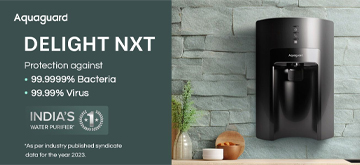
7 Features You Must Look For When Buying A New Water Purifier
PUBLISHED ON: 12-Sept-2025
Choosing a water purifier today goes beyond simply picking a model off the shelf. Water quality varies widely across regions, from high TDS borewell supplies to microbe-prone municipal water, and even tanker deliveries can carry hidden contaminants. Understanding the features of a water purifier helps consumers ensure that their choice provides not only clean water but also long-term reliability and protection for their family’s health.
With so many options available in the market, knowing what to look for can prevent unnecessary expenses, frequent maintenance, and inefficient purification. An informed choice allows households to invest in a system that balances advanced filtration, durability, convenience, and even health benefits, turning a daily necessity into a smarter, safer, and more cost-effective solution.
Here are some features to look for:
Advanced Filtration Technology
The core of any effective water purifier is its filtration system. Reverse Osmosis (RO) is essential for high TDS or hard water areas as it removes dissolved salts, heavy metals like lead and arsenic, and other impurities. Ultraviolet (UV) purification destroys bacteria, viruses, and pathogens, making water microbiologically safe. Ultrafiltration (UF) is ideal for removing sediments and suspended particles without using electricity. A combination of RO water purifier with UV and UF ensures comprehensive purification, addressing both chemical and biological contaminants. Modern purifiers often integrate all three for maximum protection.
Water Source Compatibility
Water sources vary from household to household. While municipal water may have low TDS but microbial contamination, borewell water can contain high dissolved salts, minerals, and even heavy metals. A good water purifier must be compatible with multiple sources, including municipal, borewell, and tanker water. Considering the source before purchase is vital to avoid ineffective purification or frequent maintenance issues.
Filter Life and Maintenance
Frequent filter replacements can be one of the biggest problems when investing in a water purifier. Many purifiers require filter changes every 6 to 12 months, adding recurring costs and service visits. But the advanced water purifiers offer a 2 year filter life, which reduces hassle, cuts maintenance costs, and ensures uninterrupted clean water. A longer filter life also means fewer chances of system clogging and consistent performance. Consumers should also look for easy-to-replace filters and accessible service networks to simplify upkeep.
Storage Capacity
Storage capacity is an often-overlooked feature, but it is crucial for daily usage. Families may need anywhere from 5 to 10 litres of purified water at a time, while offices or larger households require bigger tanks. Some water purifiers come with in-built storage tanks that allow water to be available even during power cuts or low supply hours. Choosing the right tank size ensures convenience without compromising on water availability.
Smart Features and Indicators
Modern water purifiers are not just functional; they are intelligent. LED or digital indicators alert users about filter life, a full tank, and service needs. IoT-enabled purifiers offer app-based monitoring of water quality, filter status, and even automatic service requests. Such features make managing purification easier and reduce the risk of using water with exhausted filters. For those who like to stay on top of maintenance, smart features are invaluable.
Additional Health Benefits
Some water purifiers go beyond basic cleaning to enhance the health value of water. Features like active copper technology or alkaline boost technology add essential minerals while maintaining purity. Copper-enriched water, for example, has antimicrobial properties and can aid immunity and digestion. Alkaline water helps balance body pH and supports overall wellness. These benefits make daily drinking water not just safe, but also healthier.
Cost and Value for Money
Price is always a consideration, but it should be weighed against performance and longevity. A higher initial investment in a purifier with advanced filtration, long-lasting filters, and smart features often leads to long-term savings by reducing maintenance costs and filter replacements. You should compare water purifier prices against the total cost of ownership, including filter life, service charges, and additional features.
Some Popular Aquaguard Models
Two products that exemplify these features include:
Aquaguard Delight NXT RO+UV+UF Aquasaver Water Purifier
This model combines RO, UV, and UF purification. It has a Mega Sediment Filter that prevents clogging and ensures smooth operation. With its advanced purification and durable filter system, it suits both high-TDS borewell water and municipal supply.
Aquaguard Glory RO+UV Stainless Steel Alkaline Water Purifier
Ideal for households seeking both safety and health benefits, this purifier features RO and UV purification along with alkaline mineralisation. The stainless steel design ensures hygiene, while smart indicators keep users informed about filter life and maintenance.
Conclusion
When selecting the best water purifier for the home, it’s important to consider a combination of safety, convenience, and long-term value. Advanced filtration technology, compatibility with multiple water sources, long filter life, adequate storage, smart monitoring, and additional health benefits together determine whether a purifier truly delivers.
By paying attention to these features, you can make a well-informed choice that safeguards health, reduces maintenance hassles, and delivers consistent access to safe, healthy water every day.
Frequently Asked Questions
Why is it important to check the purification technology in a water purifier?
Different water sources have different impurities. Choosing the right technology, RO, UV, or UF, ensures effective removal of dissolved salts, microbes, and sediments for safe drinking water.
How does water filter life impact the efficiency and cost of a water purifier?
Longer filter life reduces the frequency of replacements, lowers maintenance costs, and ensures consistent purification performance over time.
Should I consider storage capacity when buying a water purifier?
Yes. Storage capacity determines how much purified water is available at a time, which is especially important for families or areas with an irregular water supply.
